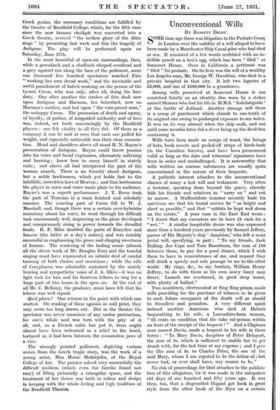The " Antigone " at Br adfield A s . with Shakespeare, so
with Sophocles, full under- standing comes not from reading, but from seeing the poet in action on the stage. It is thus that the spectator feels—almost too poignantly feels—the strokes of characterization and contrast, the subtle touches, the finished art of the poet, all of which go to complete the studied harmony of the whole. If a better understanding of a play flows, then, from seeing it on the stage, how much fuller must be the understanding consequent on a scenic representation, which in setting, architecture and decoration is as near as may be to that stage for which Sophocles actually wrote and round which sat a white-chitoned and critical Athenian audience ! (Due allowance in this Bradfield case must be made for an audience decked in homburgs,bowlers and feminine varia- an audience to whom the sackcloth cushions on the concrete kerkides were fundamentally grateful.) To the extent permitted in our greyish hyperborean region as compared with the clear, unwinking blue of Mediterranean skies and limited by the essential differences of the Nordic and Greek genius, the necessary conditions are fulfilled by the theatre of Bradfield College, which, for the fifth time since the now famous chalkpit was converted into a Greek theatre, revived " the mellow glory of the Attic stage " by presenting last week and this the tragedy of Antigone; The play will be performed again on Saturday, June 27th.
In the most beautiful of open-air surroundings, then, while a greenfinch and a chaffinch chirped overhead and a grey squirrel ran along the base of the pediment, some one thousand five hundred spectators watched Fate " working her own dread work," and the inevitable and awful punishment of hubris centring on the person of the tyrant Creon, who was only, after all, doing his bare duty. One after another the strokes of fate dash- now upon Antigone and Haemon, her betrothed, now on Haemon's mother, and last upon " the vain-proud man," the unhappy Creon. The procession of death and agony, of loyalty, of pathos, of misguided authority and of love was, indeed, set forth convincingly by the Bradfield players : one felt vitality in all they did. Of them as a company it can be said at once that each one pulled his weight, and especially noticeable was their clear enuncia- tion. Head and shoulders above all stood R. N. Rayne's presentation of Antigone. Rayne could throw passion into his voice and facial expression, alternately softening and burning ; knew how to carry himself in stately exits ; and above all had interpreted the part of the woman anarch. There is no ferocity about Antigone, but a noble lawlessness, which yet holds fast to the infallible, unwritten laws of Heaven ; and that lawlessness the player in mien and voice made plain to his audience. Rayne's was a superb performance. J. T. Reese took the part of Teiresias in a most finished and scholarly manner. The exacting part of Creon fell to W. J. Marshall, and, though there was a certain over-hybristic monotony about his voice, he went through his difficult task uncommonly well, improving as the piece developed and conspicuously rising in power towards the dreadful finale. R. P. Miles doubled the parts of Eurydice and Ismene (the latter at a day's notice), and was notably successful in emphasizing the grace and clinging sweetness of Ismene. The rendering of the boding music (almost all the clever work of Mr. Douglas Fox) and the tuneful singing must have represented an infinite deal of careful training of both chorus and musicians ; while the role of Coryphaeus was admirably sustained by the stately bearing and sympathetic voice of J. A. Olive—it was no light task for him and his fourteen fellows to sing for a large part of two hours in the open air. At the end of all Mr. C. Bellamy, the producer, must have felt that his labour was well repaid.
Quid plura ? One returns to the point with which one started. On reading of these agonies in cold print, they may seem too long drawn out. But in the theatre the spectator was never conscious of any undue protraction, for one's whole soul was torn with the pity of it all, and, as a French critic has put it, tears might almost have been welcomed as a relief to the heart, tortured as it had been between the remorseless jaws of a vice.
The strongly painted pediment, depicting various scenes from the Greek tragic story, was the work of a young artist, Miss Maisie Meiklejohn, of the Royal College of Art. The painter solved very successfully the difficult problem (which even the Greeks found not easy) of filling pictorially a triangular space, and the treatment of her theme was both in colour and design in keeping with the whole feeling and high tradition of the Bradfield Theatre.







































 Previous page
Previous page